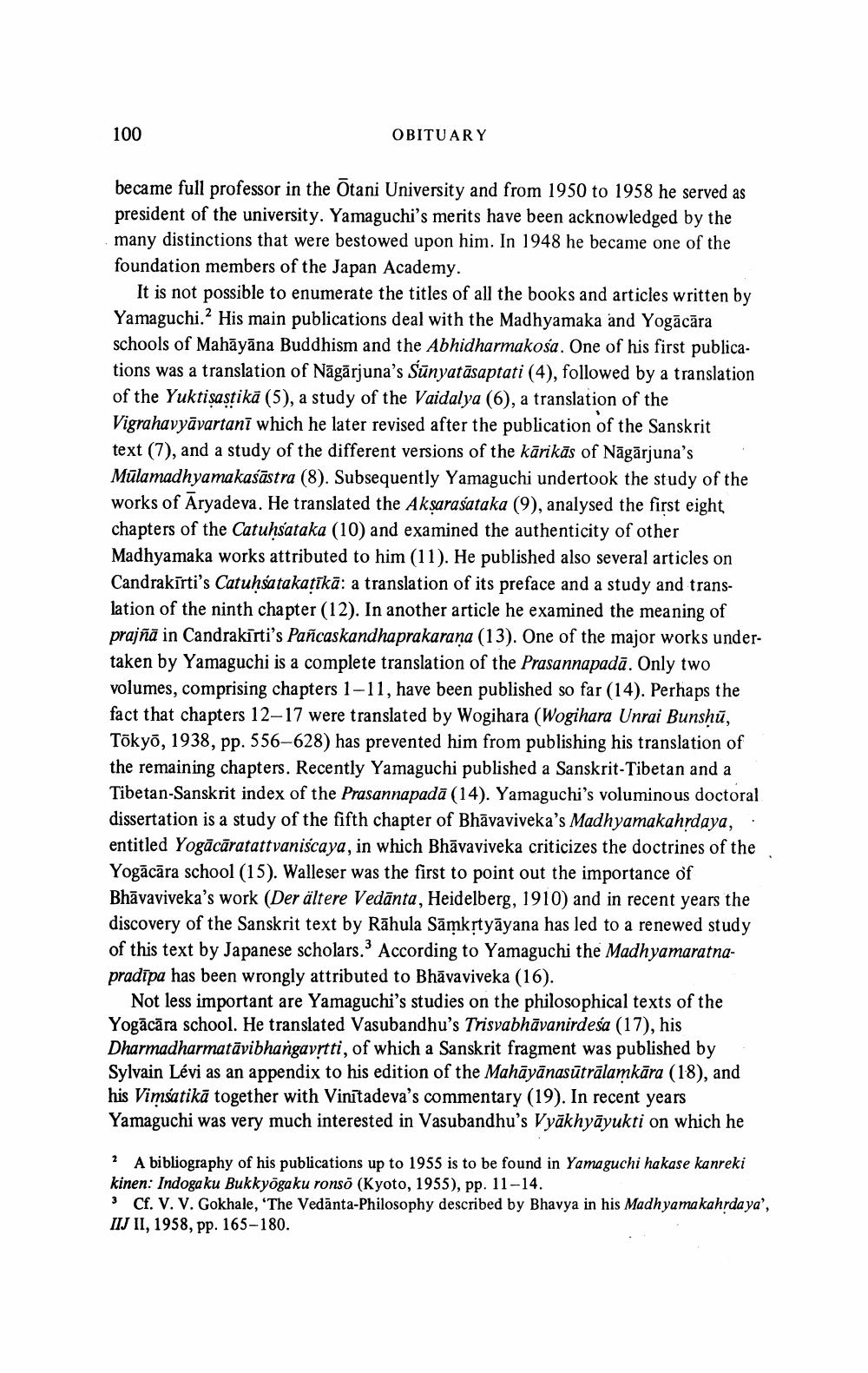Book Title: Yamaguchi Susumu Author(s): Publisher: View full book textPage 2
________________ 100 OBITUARY became full professor in the Otani University and from 1950 to 1958 he served as president of the university. Yamaguchi's merits have been acknowledged by the many distinctions that were bestowed upon him. In 1948 he became one of the foundation members of the Japan Academy. It is not possible to enumerate the titles of all the books and articles written by Yamaguchi.? His main publications deal with the Madhyamaka and Yogacara schools of Mahayana Buddhism and the Abhidharmakosa. One of his first publications was a translation of Nagarjuna's Sunyatasaptati (4), followed by a translation of the Yuktisastika (5), a study of the Vaidalya (6), a translation of the Vigrahavyavartani which he later revised after the publication of the Sanskrit text (7), and a study of the different versions of the karikas of Nagarjuna's Mulamadhyamakasastra (8). Subsequently Yamaguchi undertook the study of the works of Aryadeva. He translated the Aksarasataka (9), analysed the first eight chapters of the Catuhsataka (10) and examined the authenticity of other Madhyamaka works attributed to him (11). He published also several articles on Candrakirti's Catuhsatakatika: a translation of its preface and a study and translation of the ninth chapter (12). In another article he examined the meaning of prajna in Candrakirti's Pancaskandhaprakarana (13). One of the major works undertaken by Yamaguchi is a complete translation of the Prasannapada. Only two volumes, comprising chapters 1-11, have been published so far (14). Perhaps the fact that chapters 12-17 were translated by Wogihara (Wogihara Unrai Bunshu, Tokyo, 1938, pp. 556-628) has prevented him from publishing his translation of the remaining chapters. Recently Yamaguchi published a Sanskrit-Tibetan and a Tibetan-Sanskrit index of the Prasannapada (14). Yamaguchi's voluminous doctoral dissertation is a study of the fifth chapter of Bhavaviveka's Madhyamakahrdaya, : entitled Yogacaratattvaniscaya, in which Bhavaviveka criticizes the doctrines of the Yogacara school (15). Walleser was the first to point out the importance of Bhavaviveka's work (Der altere Vedanta, Heidelberg, 1910) and in recent years the discovery of the Sanskrit text by Rahula Samkrtyayana has led to a renewed study of this text by Japanese scholars. According to Yamaguchi the Madhyamaratnapradipa has been wrongly attributed to Bhavaviveka (16). Not less important are Yamaguchi's studies on the philosophical texts of the Yogacara school. He translated Vasubandhu's Trisvabhavanirdesa (17), his Dharmadharmatavibhangavrtti, of which a Sanskrit fragment was published by Sylvain Levi as an appendix to his edition of the Mahayanasutralamkara (18), and his Vimsatika together with Vinitadeva's commentary (19). In recent years Yamaguchi was very much interested in Vasubandhu's Vyakhyayukti on which he ? A bibliography of his publications up to 1955 is to be found in Yamaguchi hakase kanreki kinen: Indogaku Bukkyogaku ronso (Kyoto, 1955), pp. 11-14. 3 Cf. V. V. Gokhale, 'The Vedanta-Philosophy described by Bhavya in his Madhyama kahrdaya', IIJ II, 1958, pp. 165-180.Page Navigation
1 2 3 4 5
